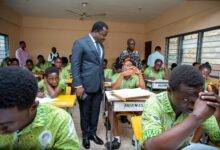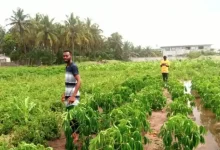
A five-year strategy to improve access to Water, Sanitation and Hygiene (WASH) services to about five million Ghanaians has been launched in Accra.
Developed by WaterAid Ghana, the strategy is focused on helping to achieve universal, sustainable and safe access to WASH in the Bongo District in the Upper East Region by 2028.
It also focused on prioritising WASH across the health sector to improve public health through improved hygiene behaviour within diverse communities, healthcare facilities and schools across the country.
Also, the strategy is aimed at strengthening the resilience of WASH to climate change in the Upper East and Upper West regions.
Speaking at the event, Ms Ewurabena Yanyi-Akofur, Country Director of WaterAid Ghana, said, the implementation of the strategy within the given period was estimated to cost about £12 million pounds.
She said, the strategy embodies WaterAid’s commitment to strengthening the capacity of local authorities to expand and deliver WASH services that were sustainable and equitable in the face of climate change and other challenges.
“We are facing unprecedented challenges, including the recent COVID-19 pandemic, climate change, and the persistent inequalities that hinder progress towards achieving the sustainable Development Goals (SDGs).
This strategy offers a blueprint for how we can collectively work over the next five years towards a better future, where everyone has access to safe water services, sanitation, and hygiene, regardless of their location, gender, or socioeconomic status,” Ms Yanyi-Akofur stated.
She noted that, the objectives of the strategy would be achieved through partnerships, capacity building, gender responsiveness and advocacy.
The WaterAid, she said, was convinced that the new strategy would help realising the vision of every Ghanaian gaining access to clean water, decent toilets, and good hygiene.
The Deputy Minister of Sanitation and Water Resources, Mr Amidu Issahaku Chinnia, said, access to clean water, decent toilets and good hygiene is not just a basic human right but also a foundation for health, dignity and total well-being.
He noted that, it was disheartening that a significant portion of the Ghanaian population still lack access to basic necessities saying the consequences of inadequate WASH services impact health, education, economic productivity and human development.
The WaterAid Ghana strategy, he said, aligned with Ghana’s vision and commitments to the Sustainable Development Goals, adding that strategy would help in the delivery of clean water, safe toilets and proper hygiene for all Ghanaians by 2030.
Already, the Deputy Minister said, that the country had made significant strides in increasing improved household toilets from around 13 per cent in 2018 to over 25 per cent, particularly through the Water for All Agenda, water supply systems in urban and rural areas, have been rehabilitated and expanded to improve water access and quality as well as the Greater Accra Metropolitan Area (GAMA) Project which have seen to the development of 48,641 improved household toilets for the benefit of 389,128 Ghanaians.
He called on relevant groups and organisations to work together with government towards using innovation and resources as well as novel approaches and technologies to optimise WASH service delivery.
Mr Chinnia urged for the prioritisation of capacity building and knowledge sharing to ensure that WASH professionals and technicians have the necessary skills and expertise to implement sustainable solutions.
Mr Stephen Yakubu, Upper East Regional Minister, said sustainability and ownership were key to make the WASH programmes succeed and called on WaterAid to involve the beneficiary communities in the implementation process.
BY CLAUDE NYARKO ADAMS







